カウンセリング希望の方や
本研究に関するお問い合わせ
依存四類型
Four categories
「依存四類型」とは?
2013年、アスリートの協力を得て、才能教育を受けてきたアスリートの競技引退期のこころの内面についてわかったものです。ここでは
- 人生の中で危機を経験せず、親や指導者らの意思決定に依存的である(マーシャの「早期完了」)
- エリクソンが言う「発達課題」に比べて、こころが未熟である
ことがわかってきました。
さらに
- 「アスリートと親/指導者らとの情緒的関係性」
- 「アスリート自身の感じていること」
- 「スポーツの意味」
に注目して分析を進めたところ、4タイプ(純粋培養、支配、過干渉、構ってもらえない子)あることがわかってきました。
依存四類型(小川,2013)
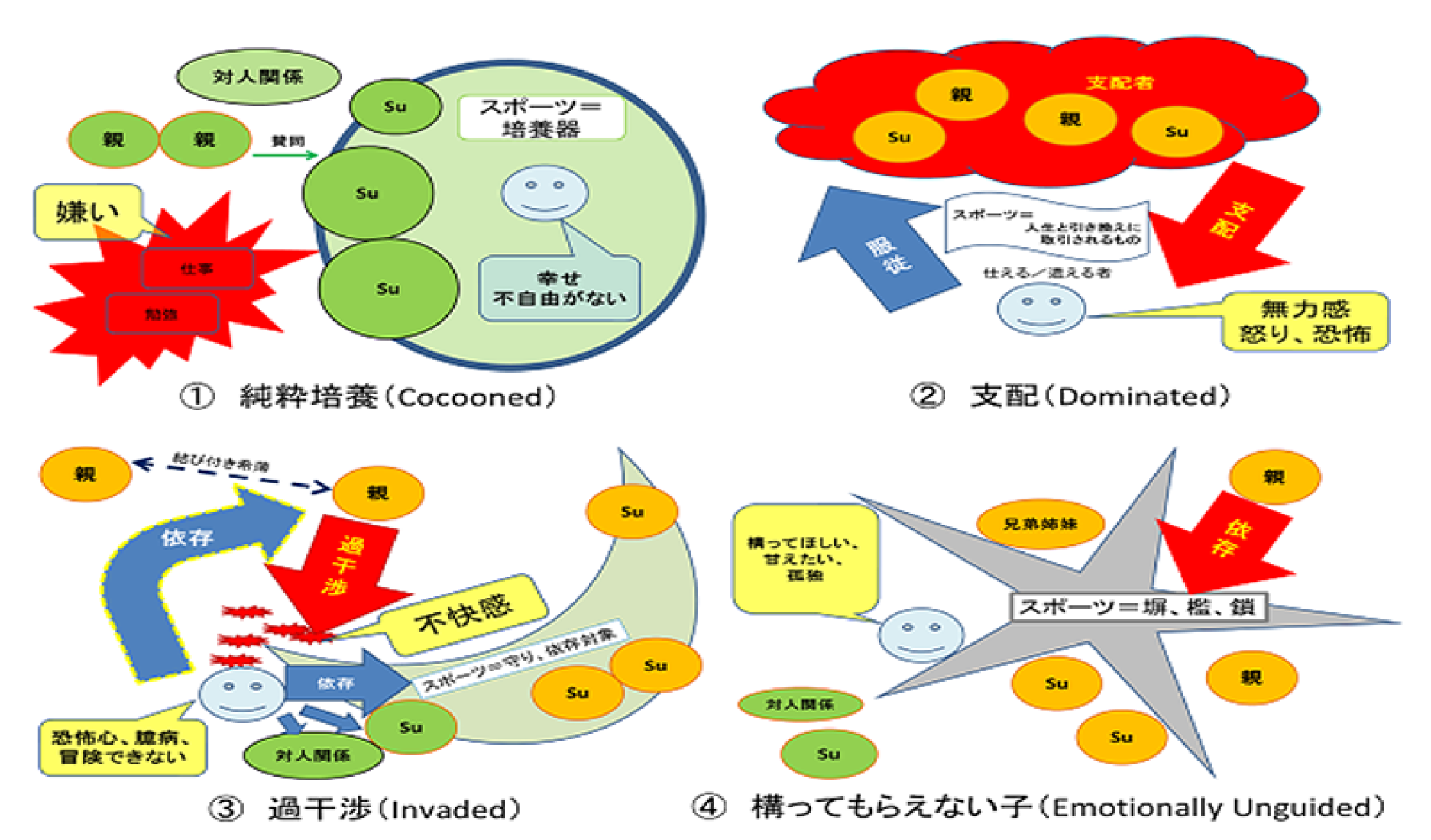
注)2013年版は閲覧不可です、2015年版はそれを要約して公開しています
このウェブサイト掲載のために、カテゴリ「支配」の下位コードを一部訂正しています。
純粋培養(Cocooned)
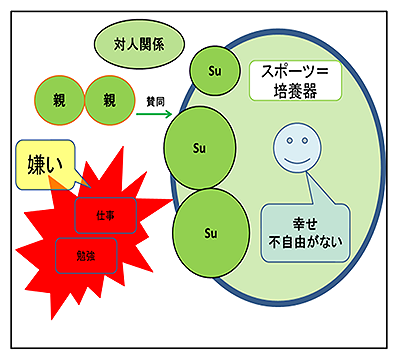
First, Cocooned. In this category, athletes are insulated in their cocoon of sports. Important decisions in the athletes’ lives are made by parents or surrogates. In some circumstances, the athletes tend to choose from a limited range of choices that are prepared by the parents or surrogates. They have rarely examined choices closely and experienced personality clashes with other people including parents or surrogates. That is why they tend not to understand their feelings and project their negative feelings which cannot be handled by displaying symptoms of sickness and by injuries.
Athletes, parents and surrogates feel happy and enjoy a convenient life in the incubator of sports. Athletes in this category have not tackled their developmental tasks since their childhood in their relationships with people including parents and surrogates.
(Olivia C. OGAWA,2015)
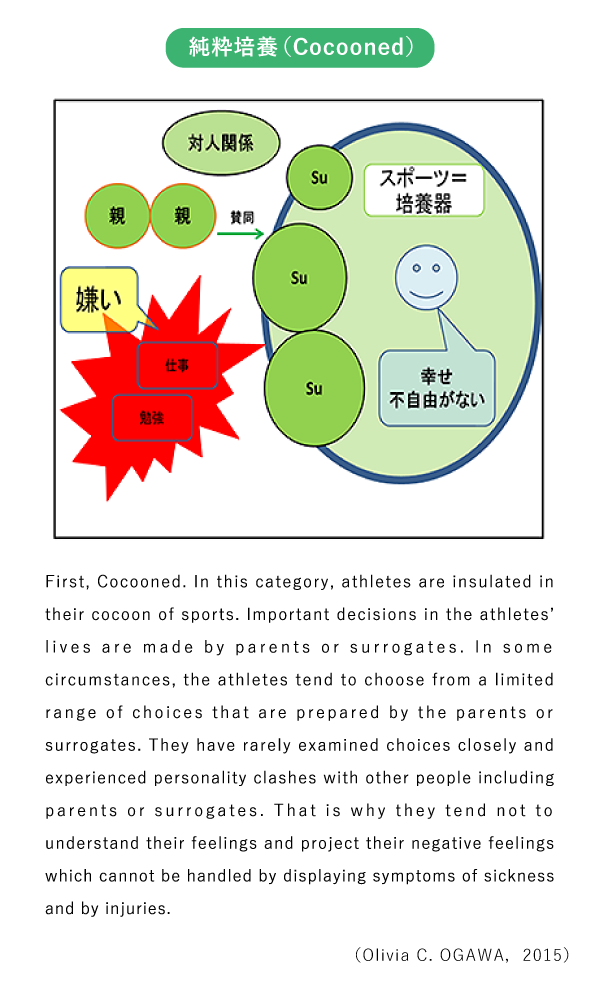
支配(Dominated)
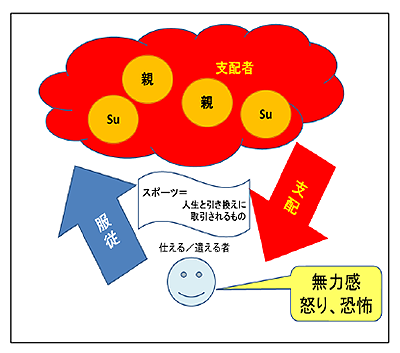
Second, Dominated. Athletes, parents and surrogates are under the relationships of control and obedience, and sports are considered as the exchange for livelihood. In other words, athletes appear as servants to parents and surrogates who behave as masters. Parents and surrogates are also psychologically immature and depend heavily on controlling athletes. On the other hand, athletes tend to behave positively, hiding their real feelings such as helplessness, aggression, and fear from their parents or surrogates.
※Some sub-codes of the category "Domination" have been corrected for posting on this website.
(Olivia C. OGAWA,2015)
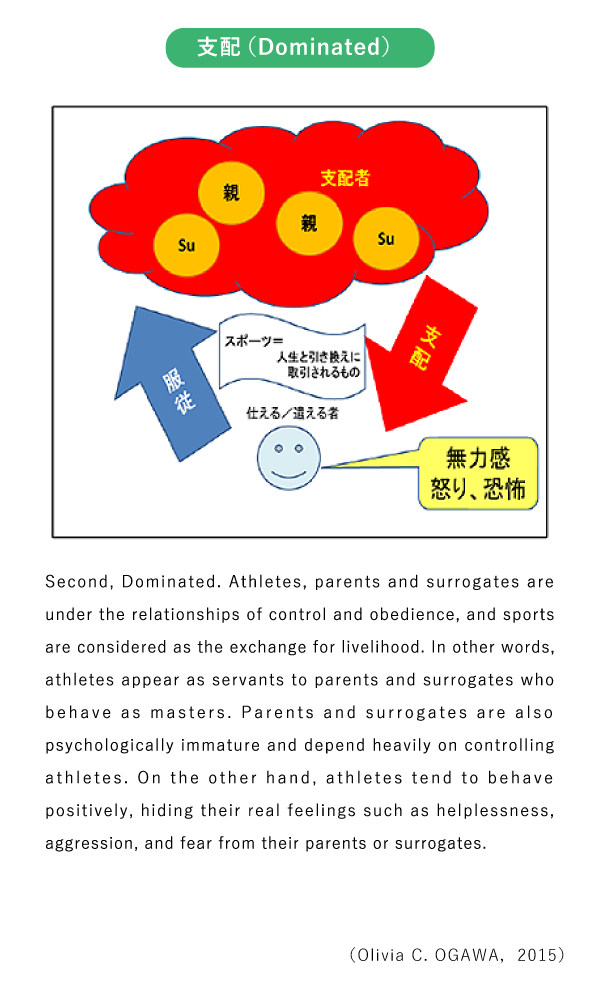
過干渉(Invaded)
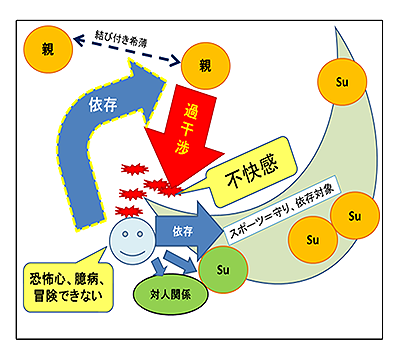
Third, Invaded. Athletes often feel annoyed about excessive interference from parents or surrogates.
Once athletes get away from the interference, they feel frightened, and then try to find safe environment, otherwise they go back to the protection of parents or surrogates. It is a vicious circle of evasion and dependence. As a result, they are dependent on parents or surrogates permanently. Sports become a defense against interference by parents or surrogates. Athletes tend to be agitated because of unexpected situations. Somatic symptoms and problematic behavior appear because they cannot handle the situations with rules and orders by parents and surrogates. Athletes have rarely tried to tackle their developmental tasks since their childhood without obtaining efficacy.
(Olivia C. OGAWA,2015)
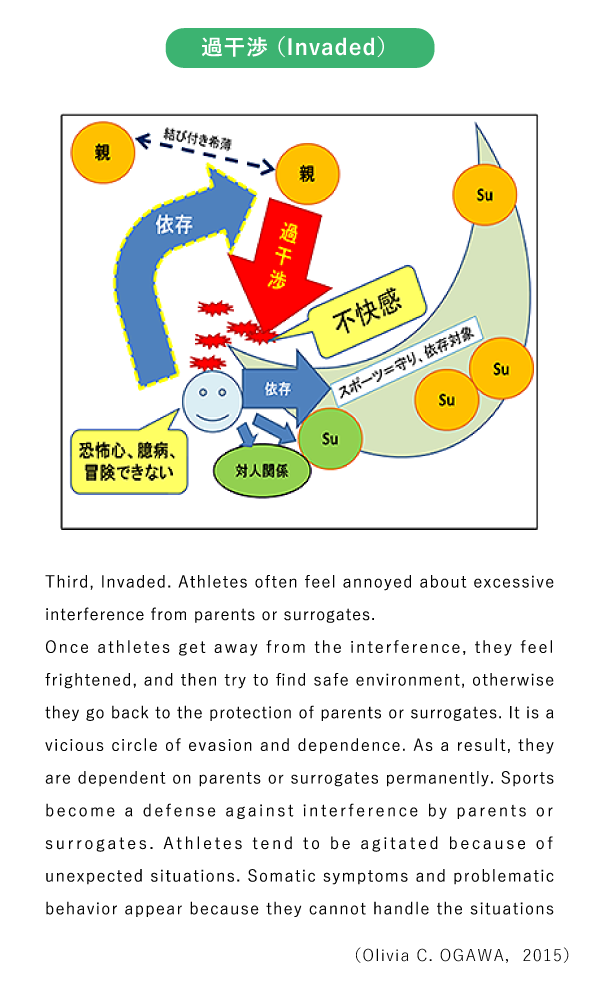
構ってもらえない子(Emotionally Unguided)
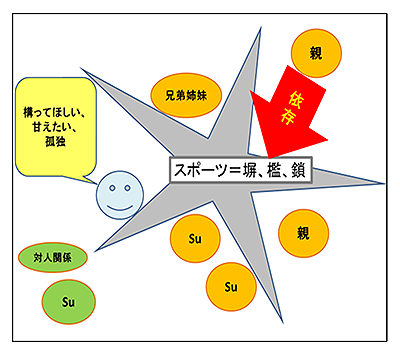
Finally, Emotionally Unguided. Sports seem like a fence between athletes and parents or surrogates that separate and also connect them. In other words, they cannot connect without sports. Parents and surrogates depend on sports, or situations in which athletes participate in sports, by giving a lot of financial support, or training. Parents and surrogates have never guided athletes emotionally. Athletes have no other way to connect with parents and surrogates outside of sports.
Athletes show somatic problems and other illnesses because of a lack of attention from parents or surrogates since their infancy.
(Olivia C. OGAWA,2015)
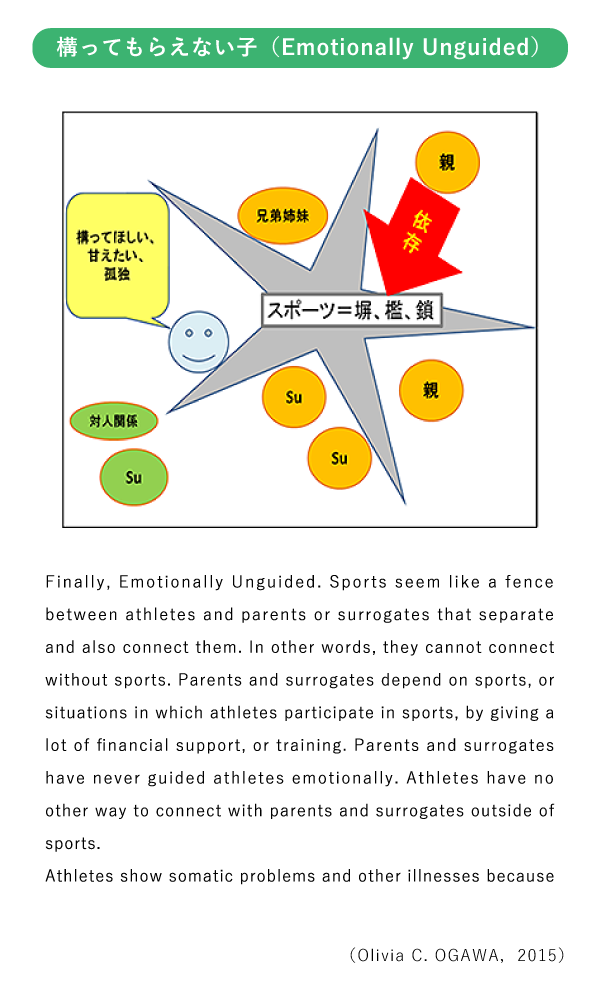
Click to enlarge the figure
望ましい支援方法の提案:5年後縦断調査の結果から ―Ogawa(2021)に基づいて―
2103の調査の際の結果を考察した際、「関係性の再構築が必要だと思う」とはいいましたが、
本音を言うと、四類型の関係性が堅固すぎて...家族・家族的関係に変化(再構築)が起こるとは思えませんでした。
しかし、5年後縦断調査の結果から次のようなことがわかりました。
5年間での関係性の変化(再構築)が自立を促している
- 大学卒業、競技引退、事故、結婚(とその相手)、就職先でのトラブルからの脱却、祖父母の動向(亡くなる、それをきっかけに集まる、など)をきっかけに、変化が起こっていました。
- アスリートには、「反抗する」、「発言する」、「距離を取る」、「(親と)喧嘩する」、「(親に)丁寧に説明する」、「友達関係で協力する」などの行動が見られました。
- 一方、親は適切な距離感で「支援」ができるようになっていました。(たとえば、手取り足取りというのではなく、好きな事を応援してくれる、苦しいときに見守ってくれる...など)
以上から、依存四類型、そのほか本課題の研究プロジェクトから、現段階で次のような支援の方法が提案できると思います。
カテゴリごとの自立の支援のポイントに違いはあるが、各人の得意なこと、興味のあることが話題に上がったら絶対に逃さず、すかさず、継続的に話題にしていく
- 関心のあること(周囲が反対・足を引っ張るなどしても心理援助では応援する、絶対叶うと信じて寄り添う...)
- 社会的仕組み、点数で見えるもので支え(過干渉)
- どのカテゴリも、心理的に裏切られたり、無二にされていることも多い。支援に枠や制限は重要なのでそれが見放しているのでないことをしっかり説明する。(特に、構ってもらえない子)
「スポーツ」と「自己」の捉えなおしを継続することで自立(人生の前進:自律)を促す
- 調査、関わり、カウンセリングを継続できること(頻度は少なくてもいい)
選手と心理支援者の距離の取り方に絶妙なコツが必要
- 連絡が取れなくなる人がスポーツ選手、依存性の高い人に多い。
- そもそも継続的な連絡(縦断調査ができたこと)が奇跡に近い
- 連絡が取れない,反応がない人への対応(調査時は?だったが...SNSで見えるもの)
- 調査は NG でもつながりは拒否されていない(SNS の普及も一助)
人に接することそのものも苦手(こころの?存在がない,薄い...)
- つかみどころがない、感情がわからない(純粋培養)
計算・人格を無二にするなどの冷たい人間関係を嫌う。
- 本当に親身になっているか、自分のことを思いやってくれるかを、とても長い時間をかけて見ている。(支配、過干渉、構ってもらえない子)




